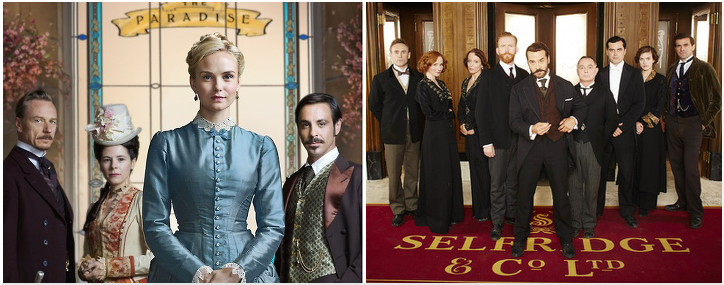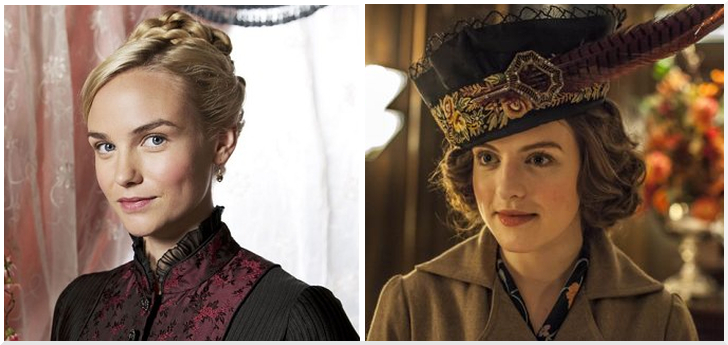
A fortnight ago ITV announced a third series of Mr Selfridge, just under a week after the BBC abruptly announced that it was cancelling period drama and rival series The Paradise. The Paradise series launch in 2012 was watched by over 6 million, with the second series’ finale drawing in over 5 million viewers. The numbers aren’t shabby. But a spokesperson for the BBC said: “We are incredibly proud to have made two successful series of period drama The Paradise for BBC1. However, in order to make room for new dramas to come through, The Paradise won’t be returning.”
The bean-counters at the BBC have made plenty of unpopular decisions before and this one outraged fans, but don’t expect the The Paradise to get a reprieve like the one recently afforded to Ripper Street. The BBC has sunk a lot of money into their new series The Musketeers, only to lose Peter Capaldi to his new role in Doctor Who. And to be frank, The Musketeers proved to be a big disappointment. Still the BBC bravely commissioned a second series after only three episodes had aired. Selfridge’s new rival The Musketeers has been steadily losing viewers, and Mr. Selfridge keeps a consistent audience.
Now as we can see The Paradise had a good audience. But much of it was filling the gap between the end of Downton Abbey and the new series of Mr. Selfridge. Would it have fared as well head-to-head against ITV’s hit period dramas?
Could it have even held on for another few seasons? Could Denise’s new face-cream empire have kept us enthralled for series three? Both The Paradise and Mr. Selfridge have two lead characters, one the male employer and entrepreneur, the other the ambitious female employee trying to make her way up in the big bad department store world. Mr. Selfridge kept the advantage, simply by keeping our feisty young heroine out of her boss’s bed. Let’s look at where The Paradise was failing.

Mr Selfridge‘s Agnes Towler is presented to us as a young girl, down on her luck and trying to make her way in the world. Her story is a believable one, she has family problems, but manages to land a good job with the help of Selfridge – albeit after he gets her fired from her first good job – and then after hard work and proving herself she moves up in her workplace. The inevitable romance or two don’t detract from her story. She even struggles in her new position. Agnes is a charming and believable heroine who is easy to relate to, without being weighed down by clichés.
There are some limitations for The Paradise, it is based on a book, Émile Zola’s novel Au Bonheur des Dames. The original story featured the romance between shop girl and employer . But the novel also describes the store from the employees’ perspective, the 13-hour workdays, sub-standard food and the bare lodgings for the female staff. The Paradise skips the social commentary and focuses on the soap-opera.
The problem with The Paradise’s Denise Lovett was that she was treading far too many tropes. She is the poor young girl from a small town arrived in the city to find a good job. She has talent beyond being an ordinary shop girl and is filled with ambition. This would have been enough. Earlier in season one she tells her workmate Clara, emphatically, that she is not in love with Moray, but wants to be him. Great. I wasn’t particularly fond of the idea of her falling love with her boss.
Denise is the subject of not only her older supervisor Miss Audrey’s envy -because Denise is young, attractive and clever so of course another woman would feel threatened – but also her workmate Clara’s wrath because Moray pays too much attention to her. This is believable, but it is also boring. Agnes Towler’s rival is a stuffy man, Mr. Thackery.
Then despite Denise’s protests she then rather suddenly falls in love with Moray. So Denise becomes the “shop girl who falls in love with handsome boss”, and also “poor girl who captures heart of eligible bachelor”. By the end of season two Moray was no longer wealthy (or was he ever actually wealthy?) but then the nasty socialite/disposable fiancée Katherine Glendenning, tries to keep the star-crossed lovers apart, slapping us with the inevitable love-triangle.
If there are not enough clichés there to choke on, Denise herself is pretty annoying. Denise is always right, her ideas are always perfect and even if Moray thinks they are not perfect then he is forced to apologise later and tell her she is perfect. Well, she may have gotten one or two things wrong over the two seasons, but generally, Denise is not an easy character to relate to. Everything is attained far too easily. Some of that is scriptwriting of course. Some of it is smirking. Her character would have benefited from not looking smug all the time.

Now onto the bosses. Both John Moray and Harry Selfridge are introduced as somewhat controversial characters, but typically so. Selfridge is married, but a womaniser. Moray is a widow, and a womaniser, and engaged to a wealthy socialite so her father can bankroll his enterprise. Both are unsurprisingly shunned at first as “low-born merchants” and both eventually make a success of their department stores. Selfridge constantly cheats on his wife but in time hits a low point where he decides to try and better himself. Great. Many of Selfridge’s redeeming qualities are displayed by his treatment of others, namely his staff. Much of this is centred on his relationship with Agnes Towler in the first season, of the platonic employer/employee sort. Moray, on the other hand, has some dark secret about his wife. He spends some of his time looking slightly creepy, some of it looking downright sleazy. This is not helped by his constant squinting. Moray redeems himself by not having killed his wife – passable – and then seducing one of his young staff members. Of course he loves this one, unlike the other employees he has bedded and discarded. Well he must be a nice guy now!

Ah, The Paradise. A romantic tale of sexual harassment. Another of The Paradise‘s shortcomings was the development of the supporting characters. Clara was a particularly interesting character yet less and less time was afforded to her storylines to make way for the great love triangle between Denise, Moray and Katherine. Poor old Dudley didn’t get any sort of storyline until late on the second season and that was tangled up with Tom Weston, who played the token villain. Dudley couldn’t even get a storyline to himself. I couldn’t even remember his name most of the time. Sam and Clara got a decent look-in, but it never played out for more than one or two episodes. I was hopeful for the new character, Myrtle the cook, but that also fizzled out. Then Sarah Lancashire, who played Miss Audrey, abruptly quit the show because it clashed with her filming Last Tango In Halifax. This is not the fault of the producers of course, and Downton Abbey creator Julian Fellowes has openly discussed difficulties in keeping English actors contracted to a show. However it was a blow to the series with a rather hasty and unconvincing storyline cooked up to cover her exit. Fellowes may have the right of it, killing them off instead, as much as it pains us.
So while we are growing rather bored of Denise/Moray/Katherine/Tom Weston, Mr. Selfridge spreads the screen time a little more evenly. Mr. Selfridge does have the advantage of the excellent Andrew Davies writing. The relationship between the two main characters is a nice one. Selfridge takes an interest in Agnes’ family problems and helps her and her brother George escape their abusive father. He gives George a job when they are struggling. He sends Agnes to Paris to study and gives her a new position in the store. He thankfully doesn’t look askance at her once. Agnes has her own two men to choose between. The struggling relationship between Harry Selfridge and his wife Rose is compelling viewing. Lady May’s story has taken a fascinating turn in season two, as has Henri Leclairs’, Mr. Grove has taken a somewhat comical but endearing direction, and Miss Mardle a rather surprising one. Even the minor characters get a good look-in, Mr. Crabb treats us to the occasional appearance of his wife, and Kitty and Frank Edwards are involved in a light-hearted thread which is a nice distraction from the dramatic WWI story that surrounds season two.
Mr. Selfridge has the right stuff, and has kept it simple. Don’t neglect your supporting cast, or the historical background, go easy on the tropes, and most of all, leave the heroine out of her bosse’s bed.

